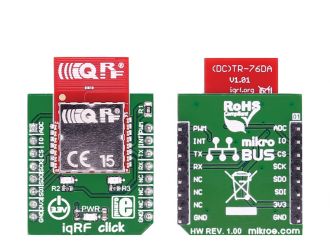
We strongly encourage users to use Package manager for sharing their code on Libstock website, because it boosts your efficiency and leaves the end user with no room for error. [more info]

Rating:
Author: MIKROE
Last Updated: 2019-08-02
Package Version: 1.0.0.1
mikroSDK Library: 1.0.0.0
Category: Sub-1 GHz Transceivers
Downloaded: 5563 times
Not followed.
License: MIT license
IQRF click carries the DCTR-76DA RF transceiver, operating in the 868/916 MHz frequency. The click is designed to run on a 3.3V power supply. It communicates with the target microcontroller over SPI or UART interface.
Do you want to subscribe in order to receive notifications regarding "iqRF click" changes.
Do you want to unsubscribe in order to stop receiving notifications regarding "iqRF click" changes.
Do you want to report abuse regarding "iqRF click".

Library Description
The library covers all the necessary functions to control iqRF Click board.
Key functions:
void iqrf_writeByte(uint8_t input) - Write Single Byte.uint8_t iqrf_readByte() - Read Single Byte.uint8_t iqrf_byteReady() - Check for new byte received.Examples description
The application is composed of the three sections :
void applicationTask()
{
char tmp;
uint8_t rdyFlag;
// RECEIVER - UART polling
rdyFlag = iqrf_byteReady();
if (1 == rdyFlag)
{
tmp = iqrf_readByte();
mikrobus_logWrite( &tmp, _LOG_BYTE );
}
// TRANSMITER - TX each 2 sec
/*
for (tmp = 0; tmp < 9; tmp++)
{
iqrf_writeByte( MESSAGE_DATA[tmp] );
Delay_ms( 100 );
}
Delay_ms( 2000 );
*/
}
Other mikroE Libraries used in the example:
UARTAdditional notes and informations
Depending on the development board you are using, you may need USB UART click, USB UART 2 click or RS232 click to connect to your PC, for development systems with no UART to USB interface available on the board. The terminal available in all MikroElektronika compilers, or any other terminal application of your choice, can be used to read the message.